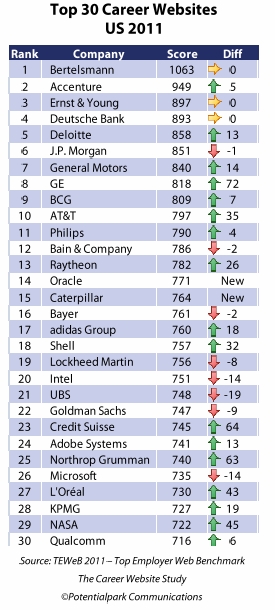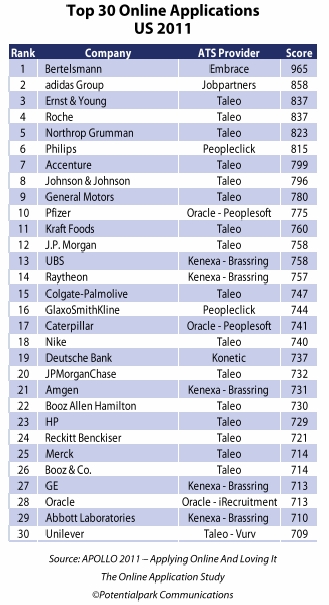 When it comes to meeting the recruitment expectations of American college students, the hands-down winner is German media conglomerate Bertelsmann. Of the 102 U.S. sites in the review, Bertelsmann’s corporate career site and online application process were found to do the best job of delivering what students say they want.
When it comes to meeting the recruitment expectations of American college students, the hands-down winner is German media conglomerate Bertelsmann. Of the 102 U.S. sites in the review, Bertelsmann’s corporate career site and online application process were found to do the best job of delivering what students say they want.
Conducted by Swedish research firm Potentialpark Communications, the firm surveyed almost 4,800 U.S. students and grads from a variety of business schools and universities. They were asked what they most wanted from career sites and the application process. From the features and component lists developed from the survey, Potentialpark analyzed 755 sites worldwide, including 102 in the U.S.
Bertelsmann came out on top on both the career site ranking and on a second ranking for the application process.
“??The biggest strength of Bertelsmann’s career website,” says the report, “is to focus on the information flow within the site itself. The thinking starts from the job seekers’ point of view and what questions they have, rather than what the company gets across.”
On the career site rankings, Bertelsmann is followed by Accenture, Ernst & Young, Deutsche Bank, and Deloitte. On the application rankings, adidas, Ernst & Young, Roche, and Northrup Grumman round out the top five.
The Potentialpark surveys come just a few days after a related survey on the candidate experience by CareerXroads. In that survey, principals Mark Mehler and Gerry Crispin and a team of volunteers applied to the 100 companies on the Fortune best companies to work for list. Three months after the last resume was sent, 25 percent of the companies failed to even acknowledge receipt.
Many companies had pre-screening questions. One had 144 multiple-choice questions that had to be completed before an application could be submitted.
Other companies had online forms that had to be filled out, in addition to uploading a resume. “Point, click, upload, and go,” Mehler says, is the ideal candidate experience. Few were set-up to do that.
Ease of applying was an important consideration in the Potentialpark research as well.
Potentialpark has conducted its Top Employer Web Benchmark study since 2003. Last year, Ernst & Young came out on top. However, this was the first year for the application process study, which it calls “Applying Online and Loving It” (APOLLO).
 ?”Students and graduates have accepted that applying online is ‘what is common today’,” says Potentialpark. “The problem is, the more they apply, the more they dislike it.”
?”Students and graduates have accepted that applying online is ‘what is common today’,” says Potentialpark. “The problem is, the more they apply, the more they dislike it.”
In the application rankings, Potentialpark lists the ATS each company uses. Of the 3o highest ranking companies, 17 use a Taleo system. But, says the report, “no service provider is a guarantee to be in the top.” Many of the most popular systems as often were among the bottom-scoring companies as they were among the top.
“In fact,” says Potentialpark, “how candidate-friendly an online application is seems to depend more on how the employer drives the project, embeds the system into the career website, and adjusts the implementation to its needs.”
Besides the rankings, the Potentialpark research found that the majority of the surveyed students and graduates don’t want to connect with prospective employers on Facebook. Instead, they prefer to engage with them on business networks.
Yet, the research found that 39 percent of the surveyed U.S. employers link their corporate career site to their social network presence. Only a quarter of them connect to a business network.
Potentialpark suspects that students may unreasonably fear that “liking” a company on Facebook will expose their personal lives to recruiters. It also theorizes that few students have business network profiles, and that companies simply prefer Facebook because it offers much more functionality and dynamic interaction.
Notes the report: “All in all, the opinion that many of the most forward-thinking employers in U.S. have come to is that it can pay off to be on both types of networks, but in different ways: Facebook for branding, LinkedIn for recruiting.”